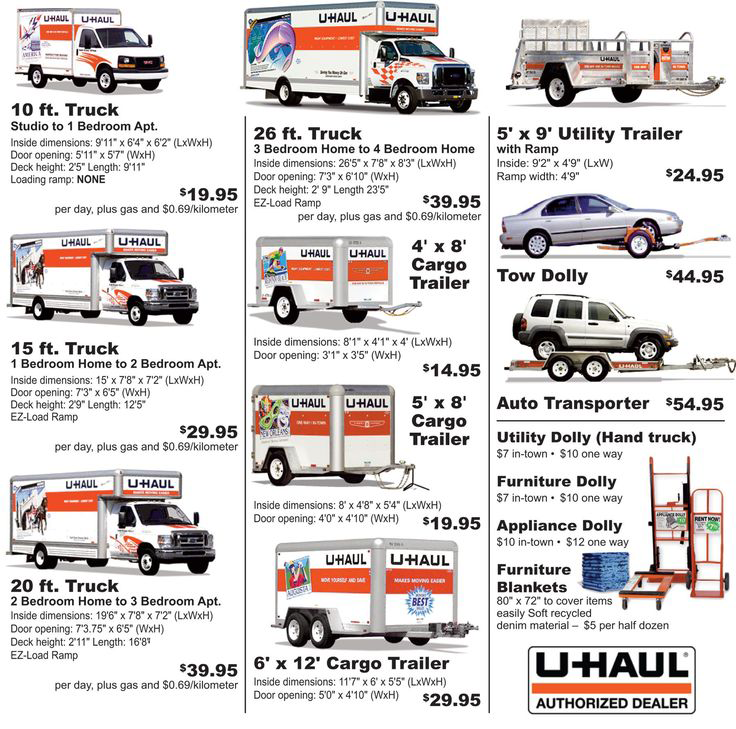The Ultimate Guide to U-Haul Trailer Rates: Everything You Need to Know
Moving can be a stressful experience, and one of the biggest considerations is transportation. Whether you're relocating across town or across the country, U-Haul trailers offer a convenient and often cost-effective solution. However, understanding U-Haul trailer rates can be confusing. This comprehensive guide will break down everything you need to know, from the factors influencing pricing to tips for securing the best deal.
Okay, here's a comprehensive guide to U-Haul trailer rates, designed to be informative, engaging, and optimized for search engines.
Why Choose a U-Haul Trailer?
Before diving into the specifics of rates, let's briefly touch on why U-Haul trailers are a popular choice for moving:
- Affordability: Compared to hiring a full-service moving company, renting a U-Haul trailer is often significantly cheaper.
- Flexibility: You have complete control over your moving schedule. Pack and load at your own pace.
- Variety of Sizes: U-Haul offers a range of trailer sizes to accommodate different moving needs, from small apartments to large houses.
- Availability: With numerous locations across North America, finding a U-Haul rental is generally easy.

Factors Influencing U-Haul Trailer Rates
Several factors determine the cost of renting a U-Haul trailer. Understanding these factors is crucial for budgeting and finding the best possible rate.
-
Trailer Size and Type:

- The size of the trailer directly impacts the rental rate. Larger trailers, capable of hauling more items, will naturally cost more. U-Haul offers various trailer sizes, typically ranging from 4x8 utility trailers to larger enclosed trailers.
- Different types of trailers also come with varying price points. Enclosed trailers, which offer protection from the elements, tend to be more expensive than open utility trailers. Trailers equipped with brakes might also have a higher rental fee.
-
Rental Duration:
- U-Haul primarily offers two rental options: local moves and one-way moves.
- Local Moves: These are typically charged on a daily rate. The longer you keep the trailer, the more you'll pay.
- One-Way Moves: One-way rentals are priced based on the distance between the pickup and drop-off locations. The further you're moving, the higher the rental cost will be.
-
Distance Traveled (One-Way Rentals):
- For one-way rentals, the distance you're moving is a primary factor in determining the price. U-Haul calculates the rate based on the mileage between your origin and destination.
- It's important to provide accurate information about your destination when booking a one-way rental. Changing your destination mid-move can result in additional charges.
-
Time of Year and Day of the Week:
- Demand for moving services fluctuates throughout the year. Peak moving seasons, such as summer and the end of the month, typically see higher rates. Weekends are also generally more expensive than weekdays.
- If possible, consider moving during the off-season or on a weekday to potentially save money.
-
Pickup and Drop-off Locations:
- The specific U-Haul locations you choose for pickup and drop-off can also influence the rental rate. Some locations may have higher demand or operating costs, which can be reflected in their pricing.
- It's worth comparing rates at different U-Haul locations in your area to see if you can find a better deal.
-
Insurance Coverage:
- U-Haul offers various insurance options to protect against damage to the trailer or your belongings. While insurance is optional, it's highly recommended.
- The cost of insurance will add to your overall rental expense. Carefully consider the level of coverage you need based on the value of your belongings and your risk tolerance.
-
Additional Equipment and Services:
- U-Haul offers a range of additional equipment and services, such as furniture pads, dollies, and moving boxes. These items can be convenient, but they will increase the total cost of your rental.
- Consider whether you need these extras or if you can source them elsewhere for a lower price.
Understanding U-Haul's Pricing Structure
U-Haul's pricing structure can seem a bit opaque at first, but breaking it down can help you understand how your rental rate is calculated.
- Base Rate: This is the fundamental cost of renting the trailer for a specific period. It varies depending on the trailer size, type, and rental duration.
- Mileage Fee (One-Way Rentals): For one-way moves, U-Haul charges a per-mile fee in addition to the base rate. This fee covers the cost of transporting the trailer back to its original location.
- Taxes and Fees: Like any rental service, U-Haul charges applicable taxes and fees. These can vary depending on your location.
- Insurance Costs: As mentioned earlier, insurance coverage is an additional expense.
- Equipment and Service Charges: Any extra equipment or services you add to your rental will be charged separately.
Tips for Getting the Best U-Haul Trailer Rates
Now that you understand the factors influencing U-Haul trailer rates, here are some practical tips for securing the best possible deal:
-
Book in Advance:
- Booking your U-Haul trailer well in advance, especially during peak moving season, can help you secure a lower rate.
- Waiting until the last minute may result in limited availability and higher prices.
-
Compare Rates at Different Locations:
- As mentioned earlier, rates can vary between U-Haul locations. Take the time to compare prices at different locations in your area.
- You might be surprised at the savings you can find by driving a little further to pick up your trailer.
-
Consider Moving During the Off-Season or on a Weekday:
- If your moving schedule is flexible, try to avoid peak moving seasons and weekends.
- Moving during the off-season or on a weekday can often result in significantly lower rates.
-
Be Flexible with Pickup and Drop-off Dates:
- If possible, be flexible with your pickup and drop-off dates. Adjusting your schedule by a day or two can sometimes lead to a lower rate.
-
Decline Unnecessary Extras:
- Carefully consider whether you need all the additional equipment and services U-Haul offers.
- If you can source furniture pads, dollies, or moving boxes elsewhere for a lower price, do so.
-
Inquire About Discounts:
- U-Haul sometimes offers discounts to students, military personnel, or members of certain organizations.
- Don't hesitate to ask about available discounts when booking your trailer.
-
Check for Online Coupons and Promo Codes:
- Before booking, search online for U-Haul coupons and promo codes.
- You might be able to find a code that can save you a percentage off your rental rate.
-
Consider a One-Way Rental vs. Round Trip:
- For long-distance moves, carefully compare the cost of a one-way rental to a round trip. In some cases, a one-way rental may be more cost-effective, especially when you factor in fuel and time.
-
Accurately Estimate Your Mileage:
- For one-way rentals, accurately estimate the distance you'll be traveling. Underestimating your mileage can result in additional charges.
- Use online mapping tools to calculate the distance between your origin and destination.
-
Read the Fine Print:
- Before signing the rental agreement, carefully read the fine print. Pay attention to any fees, restrictions, or penalties.
- Understanding the terms and conditions of your rental can help you avoid surprises down the road.
Common Mistakes to Avoid When Renting a U-Haul Trailer
Based on my experience helping people move, here are some common mistakes to avoid when renting a U-Haul trailer:
- Underestimating the Trailer Size: It's better to rent a slightly larger trailer than you think you need than to underestimate and have to make multiple trips.
- Failing to Secure Your Load Properly: Properly securing your belongings inside the trailer is crucial for preventing damage during transit. Use tie-down straps and blankets to protect your items.
- Ignoring Weight Limits: Exceeding the trailer's weight limit can damage the trailer and create a safety hazard. Be sure to check the weight capacity of the trailer before loading it.
- Not Inspecting the Trailer Before Departure: Before leaving the U-Haul location, thoroughly inspect the trailer for any existing damage. Document any damage and report it to the rental agent to avoid being held liable.
- Forgetting to Return the Trailer on Time: Returning the trailer late can result in late fees. Be sure to factor in travel time and potential delays when planning your return.
Insurance Options Explained
U-Haul offers several insurance options to protect you and your belongings during your move. Understanding these options is essential for making an informed decision about coverage.
- Safemove: This is U-Haul's most comprehensive insurance option. It covers damage to the rental equipment, accidental damage to your belongings, and medical expenses for injuries sustained during the move.
- Safetow: This option covers damage to the U-Haul trailer itself but does not cover your belongings.
- Collision Damage Waiver (CDW): This waiver protects you from financial responsibility for damage to the trailer caused by a collision.
Choosing the Right Trailer Size
Selecting the right trailer size is crucial for a successful and efficient move. Here's a general guide to help you choose the appropriate size:
- 4x8 Utility Trailer: Suitable for small apartments, dorm rooms, or hauling individual items like appliances or furniture.
- 5x8 Utility Trailer: A slightly larger option for small apartments or studios.
- 5x9 Enclosed Trailer: Offers more protection from the elements and is suitable for small apartments or studios.
- 6x12 Enclosed Trailer: A good choice for larger apartments or small houses.
- Other Sizes: U-Haul offers many other sizes for any special needs.
Alternative Moving Options
While U-Haul trailers are a popular choice, it's worth considering alternative moving options, especially for long-distance moves.
- Full-Service Moving Companies: These companies handle everything from packing to transportation.
- Moving Containers: Companies like PODS and U-Pack deliver a container to your home, which you load yourself. They then transport the container to your destination.
- Freight Shipping: For smaller moves, freight shipping can be a cost-effective option.
Conclusion
Renting a U-Haul trailer can be a convenient and affordable way to move your belongings. By understanding the factors influencing rental rates, following the tips outlined in this guide, and avoiding common mistakes, you can secure the best possible deal and ensure a smooth moving experience. Remember to book in advance, compare rates, and carefully consider your insurance options.
Disclaimer: Rates and policies are subject to change. Always confirm the latest information with U-Haul directly.
External Link: U-Haul Official Website
I hope this comprehensive guide is helpful! Let me know if you have any other questions.